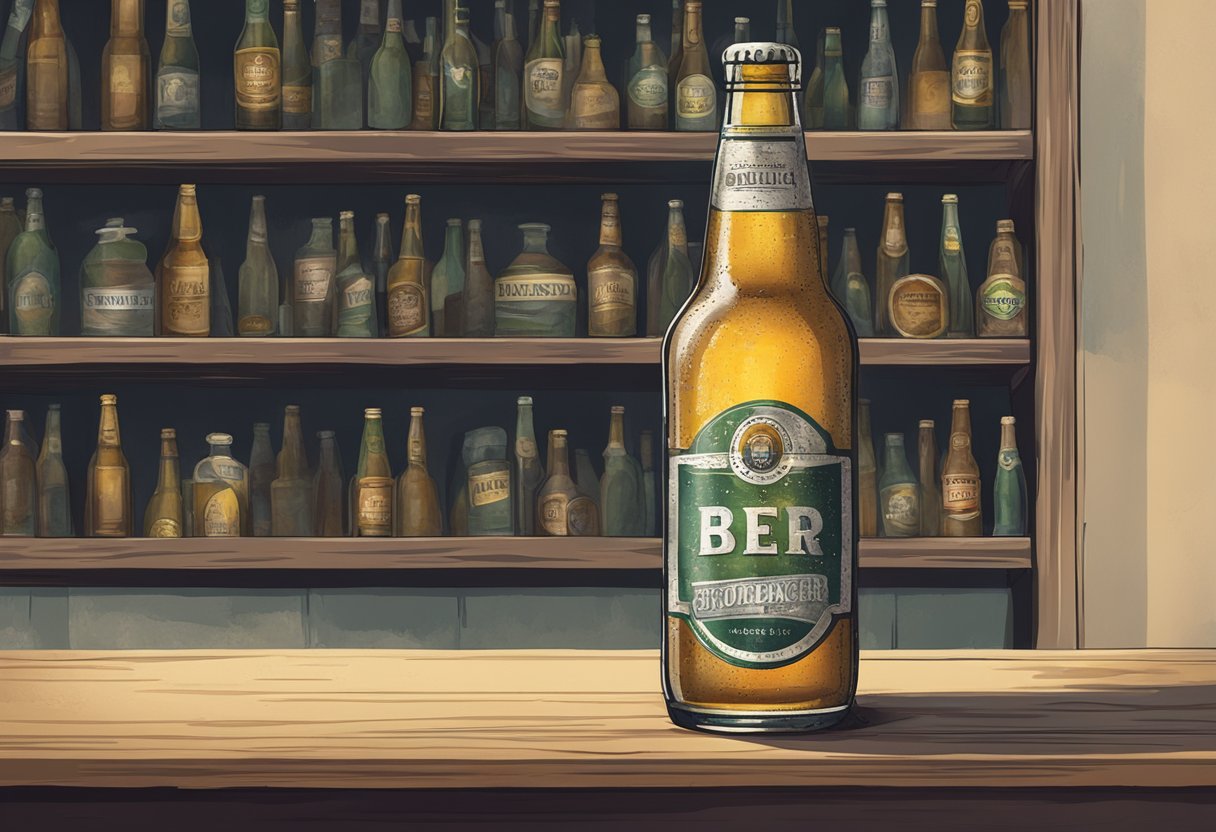When you come across an old six-pack in the back of the fridge or a beer can that’s been in the pantry for a couple of years, you might wonder if it’s still okay to drink. Often, beer comes with a best before or an expiration date, but these aren’t always a definitive guide to whether your beer will be pleasant to drink. While expired beer doesn’t typically become unsafe to consume, its flavors can certainly change. The longevity of beer varies widely depending on its style, ingredients, and storage conditions.

Over time, beer can undergo chemical changes that affect its taste and aroma. Certain beers, like those that are hop-forward, may not age as well and can lose their intended flavor profile more quickly, whereas stronger, malt-oriented beers might evolve in flavor in a way that some find appealing. It’s worth noting, however, that while the risk of getting sick from drinking beer that’s past its expiration date is low, one might still experience off-flavors or flatness due to the breakdown of compounds within the beer.
Key Takeaways
- Beer’s taste and aroma may change past the expiration date, but it often remains safe to drink.
- The type and storage of beer significantly influence its shelf life and flavor over time.
- Proper beer storage can help maintain its quality, even past the best-by date.
Table of Contents
Understanding Expiration Dates
When one buys beer, they often see dates on the packaging. These dates help determine how long the beer can be enjoyed at its best quality.
Beer Shelf Life Fundamentals
Shelf life refers to the time a beer remains fresh and maintains its intended flavor profile. For most beers, this period is not as strict as a use by date you might find on perishable foods. The best-by date or best before date is a suggestion for when to consume the beer to enjoy its optimal taste, rather than an indication of when it becomes unsafe. It’s important to understand that the shelf life of beer varies depending on its style, ingredients, and storage conditions.
Bottling and Manufacturing Indicators
The bottling date is when the beer was packaged, and it can be a useful indicator of its age. Typically, breweries also print a best-by date on their products, suggesting when the beer is best consumed. This date takes into account factors like hops and alcohol content, which affect how the beer ages. Higher alcohol beers may not deteriorate in quality as rapidly as lighter beers. However, some beers, especially those that are hop-forward like IPAs, may start to lose their characteristic flavors relatively soon after the best-by date.
Factors Affecting Beer Degradation
When storing beer, certain factors can speed up the rate at which it degrades. Knowing these factors is crucial for maintaining the quality of beer over time.
Role of Storage Conditions
The way beer is stored plays a significant role in its longevity. Beer should ideally be kept refrigerated to slow down the process of aging. Storing beer at room temperature can result in faster degradation compared to beer stored in a fridge. Here are key points:
- Refrigerated: Beer stored in a refrigerator is less likely to spoil, as the cold temperature hinders the growth of bacteria and keeps the beer fresh for a longer period.
- Room Temperature: A warmer environment can cause beer to age quicker, leading to stale flavors.
Impact of Sunlight and Temperature
Exposing beer to sunlight and high temperatures can be detrimental. UV rays in particular can cause chemical reactions in the beer, leading to off-flavors known as “skunked” beer. Here’s how to avoid it:
- Direct Sunlight: Beer should be stored away from windows or any space where it’s exposed to sunlight. Glass bottles, especially clear or green ones, offer little protection against these harmful rays.
- Temperature: Consistent, cool temperatures are best when storing beer. Fluctuations can cause beer to expand and contract, potentially damaging its flavor.
Changes in Beer Over Time
Over time, beer undergoes both chemical and physical changes which can affect its flavor and quality. These changes may lead to the appearance of off-flavors, making the beer taste different from when it was fresh.
Chemical and Physical Changes
As beer gets older, the oxidation process starts to change it. Oxygen in the air can make the beer taste stale or like cardboard. Also, beer can lose its carbonation, which means it won’t be as fizzy. The alcohol content, or ABV, mostly stays the same, but the flavor can still change a lot.
Flavor and Quality Alterations
When it comes to flavor, old beer might not taste very good. Off-flavors can develop, ruining the beer quality. A beer that once tasted fresh and lively might taste dull and bad. One might notice that an old beer is not as enjoyable as a fresh one due to these changes.
Health and Safety
When it comes to old beer, it’s important to know if it’s safe to drink and how to spot bad beer. Expired beer might not taste good because it can develop off-flavors.
Safety of Drinking Expired Beer
Generally, drinking beer that’s past its expiration date is considered safe. While beer does not spoil like raw foods, the risk of food poisoning from beer is low. Beer is an acidic environment with alcohol, which isn’t friendly to most pathogens. However, if beer is not stored properly, it could lead to contamination.
- safe to drink: Yes, generally safe
- can expired beer make you sick: Low risk of sickness
- contamination: Rare but possible if stored improperly
Identifying Spoilage and Contamination
To avoid the risks from bad beer, one must know how to identify spoilage:
- Visual Check: Look for unusual appearances like haziness or white foam that is not typical for the beer style.
- Smell: Spoiled beer might have an off smell that is sour or reminiscent of rotten eggs.
- Taste: While tasting should be a last resort, spoiled beer often has an unwanted sharp or off-flavor.
If a person notices any of these signs, they should not drink the beer. It’s better to err on the side of caution when dealing with any edible product that seems off.
Beer Types and Their Longevity
Different beers have different shelf lives. The amount of time a beer remains drinkable can vary greatly based on its style and alcohol by volume (ABV).
Variability Among Beer Styles
- IPA (India Pale Ale): Often celebrated for its hoppy flavor, an IPA’s quality tends to decline faster after its expiration date, resulting in diminished hop character.
- Lager: Lagers, being less hop-forward, generally maintain their flavor for a longer period beyond the best-by date than more hoppy beers.
Effect of Alcohol By Volume on Shelf Life
- Aged Beer: Higher ABV beers, like some strong ales or stouts, can sometimes improve with age, if stored correctly, due to a process similar to that of aging wine.
- Alcohol Content: In general, beers with a higher alcohol content, indicated as a higher ABV percentage, can be cellared and may have a longer shelf life, developing deep and complex flavors over time. However, not all high ABV beers are suitable for aging.
Practical Considerations
When considering whether to drink beer that is two years past its date, individuals should weigh the potential changes in flavor against the safety of consuming the beverage. Here are the key factors to think about.
Deciding to Drink Expired Beer
Expired beer may develop off-flavors, which can include a cardboard-like, stale taste or a loss of the beer’s original hop character. Although these flavors are generally unpleasant, they typically do not pose health risks. Most people find that beer’s taste after the expiration date changes, often negatively, but beer doesn’t spoil like perishable food. Beer is less prone to bacterial growth due to its alcohol content and hops, which are natural preservatives. As a result, it’s usually safe to drink expired beer, although the enjoyment of its taste may be diminished, especially with hoppy beers like IPAs that degrade faster.
Alternative Uses for Old Beer
If one decides the taste of expired beer is not to their liking, there are alternative uses. Old beer can be used in cooking to add flavor to dishes such as stews, bread, or as a meat tenderizer. As it’s still a liquid with organic plant ingredients, it can also be a nutrient-rich addition to one’s garden soil. Thus, even if one does not wish to drink expired beer, it can serve a purpose beyond pouring down the drain.
Storing Beer Properly
To ensure that beer maintains its intended flavor and freshness, proper storage is crucial. Temperature control and choosing the right container can make a significant difference in how well beer ages.
Refrigeration and Container Types
Refrigeration: Keeping beer in a fridge is vital for preserving its quality over time. Beer should be stored at a stable temperature, and most types of beer are best kept cool between 35°F to 55°F (1.6°C to 12.7°C).
- Aluminum cans: Lightweight and less susceptible to light, they’re great for keeping beer fresh.
- Glass bottles: Darker bottles are better at protecting beer from light, which can cause spoilage.
- Kegs: Larger volumes of beer, like those in kegs, should be consistently refrigerated and consumed within a set period once tapped.
Guidelines for Growlers and Opened Beer
Growlers: A growler is a glass, ceramic, or stainless steel jug used to transport draft beer. They’re not intended for long-term storage, and one should consume the beer within 1 to 3 days after opening.
- Opened beer: Once beer is opened, it should be consumed within 24 hours. Afterward, it gradually loses carbonation and flavor.
- For both growlers and opened bottled beer, always seal tightly and store upright in the fridge to maintain quality.
Advanced Beer Aging Techniques
Advanced beer aging techniques allow enthusiasts to enhance the flavor of their beers intentionally. Unlike consuming expired beer, which can result in unexpected and often unpleasant flavors, these methods focus on developing a beer’s taste profile over time.
Intentional Aging vs. Expired Beer
Intentional Aging: Beer lovers sometimes age beer on purpose, also known as cellaring, to allow complex flavors to develop. This process involves keeping beers in a controlled environment, where factors like temperature, humidity, and light are carefully managed. For example:
- Temperature: Ideal conditions for aging ales are around 55°F.
- Light: The beer should be stored in the dark to prevent light-induced spoilage.
- Time: Time frames for aging can vary, ranging from several months to several years.
Expired Beer: On the other hand, a beer that is simply ‘out of date’ has surpassed its intended consumption window and was not aged under controlled conditions. Drinking such beer might not be harmful, but it may taste flat or sour due to the unplanned oxidation process, which can negatively affect its flavor.
People who intentionally age beer aim to control the oxidation process to enhance the beer’s qualities, while expired beer typically undergoes an uncontrolled oxidation process that might deteriorate the overall experience.
Frequently Asked Questions
This section addresses common inquiries regarding the consumption and safety of beer that is significantly past its expiration date.
What are the potential risks of consuming beer that has exceeded its expiration date by a significant period?
The risks of consuming beer two years past its expiration date are typically not related to safety, as beer does not spoil in the way foods do. However, the quality of the beer may greatly diminish, resulting in off flavors and aromas.
How does the storage condition, such as refrigeration, impact the quality and safety of beer past its expiration date?
Beer’s taste and quality are preserved longer when stored properly, such as in a cool, dark place. Refrigeration can slow down the aging process, but it does not halt it. Beer can still degrade in quality over time, even if kept cold.
Are there any distinctive changes to the taste or alcohol content in beer that has been stored unopened for multiple years?
Beer that’s unopened for years may develop a stale or flat taste, and while the alcohol content remains stable, it may taste different from fresh beer due to oxidation and other aging processes.
What are the common signs that beer has gone bad and should not be consumed?
Beer that’s gone bad might have a sour smell, cloudy appearance, and it may taste off. If a beer has noticeable defects, such as a skunky aroma, it’s an indication that it should not be consumed.
Is there a difference in shelf life between mass-produced and craft beers after their printed expiration dates?
Craft beers often have a shorter shelf life compared to mass-produced ones. This variance is due to the different brewing techniques and levels of preservatives used. Mass-produced beers are more likely to be pasteurized, which can extend their viability past the expiration date.
Aside from drinking, are there alternative uses for beer that is significantly past its suggested consumption date?
Beer that is not suitable for drinking can still be useful. It may serve as a cooking ingredient, garden fertilizer, or cleaning agent. The content and quality of the beer determine its suitable alternative uses.







